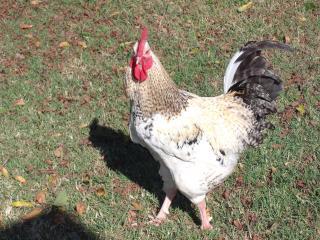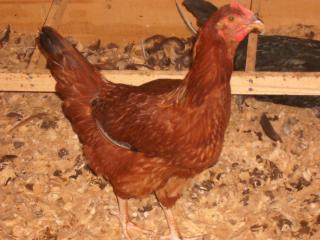I want to start a small flock to fill the freezer and wanted to know what's the best breed to raise based on the ease of processing them, I don't want to spend extra time cleaning pin feathers and other things that might make this harder than possible but I still want the meat to have flavor. Can you also give me an age to process birds you reccomend? Is there a thread for this already, if so can someone point me in that direction? I currently have some Sussex Splits and thinking about getting some Delaware and BO hens for my Roos. Opinions Please!!!!
Navigation
Install the app
How to install the app on iOS
Follow along with the video below to see how to install our site as a web app on your home screen.
Note: This feature may not be available in some browsers.
More options
You are using an out of date browser. It may not display this or other websites correctly.
You should upgrade or use an alternative browser.
You should upgrade or use an alternative browser.
Easiest DP breed to process????
- Thread starter robnms
- Start date
More options
Who Replied?For ease of processing, I would go with good Delaware or White Rock stock. Buy the best stock you can... and not from a hatchery.
Those are good breeds. Orps if you prefer dark meat. There isn't much difference in processing... except we really had a hard time plucking the Barred Rock roos. Pinfeathers.
14-18 weeks is a good number for tender meat if you hope to fry or grill. Up to 6 months for larger size but slow cook, at least until you get accustomed to the different "bite" or chewiness. Brining a while helps tenderize a lot, but watch out for getting it too salty; I won't brine more than a few hours. It's not really necessary at all, again, once you get used to the different texture. Many prefer it after eating a few.
If you happen to have a clay cooker they are wonderful for an older bird -- keep the meat tender and juicy.
14-18 weeks is a good number for tender meat if you hope to fry or grill. Up to 6 months for larger size but slow cook, at least until you get accustomed to the different "bite" or chewiness. Brining a while helps tenderize a lot, but watch out for getting it too salty; I won't brine more than a few hours. It's not really necessary at all, again, once you get used to the different texture. Many prefer it after eating a few.
If you happen to have a clay cooker they are wonderful for an older bird -- keep the meat tender and juicy.
- Thread starter
- #4
Quote:
I'm used to eating older chickens, I'm from La and my Aunt raises chickens but we usually eat the older chickens and roos in a gumbo after they simmered for a while and they do make good gumbo.
I'm used to eating older chickens, I'm from La and my Aunt raises chickens but we usually eat the older chickens and roos in a gumbo after they simmered for a while and they do make good gumbo.
There is a little difference in most dual purpose breeds in configuration. Some give you a little more breast meat and some more in the thighs or drumsticks. But I find those differences are more in the line of the chickens than the breed. Not all Delaware are created equal, for example. Some specific Delaware will have different body configuration than others. The stock you start with is very important. The same is true with all breeds. The Cornish, not the Cornish Cross but the true Cornish, give pretty good breast meat. Most of the rest are probably going to be better in the dark meat department. Cornish are not known to be great layers compared to many other though. There are always tradeoffs.
I suggest you look at breeds that are going to produce white or light-colored chicks. The reason, as others mentioned, is the pin-feathers. If you skin, that does not matter, but if you pluck, it might. I'd expect a Delaware rooster to produce white offspring, but with black barring in the neck, tail, and maybe wing feathers. Still a nice carcass from the pinfeather aspect. A BO rooster will lighten the color of the Sussex feathers (I'm assuming Speckled Sussex. Not sure what you mean by splits). Whether that is enough to suit you or not, I don't know.
With a Speckled Sussex rooster, the Delaware will give you a sex link. The hens will be dark red with a black tail and the roosters will be white with black barring in the tail, neck and wings. The BO hens with that rooster give you a chicken that is reddish, somewhere between the dark mahogony of the SS and the Buff of the BO. Not a sex link.
Here is a shot of my SS rooster/ Delaware hen cross.


I have limited experience with different breeds. I find age and sex has more to do with the differences in processing than breed. Not so much in hens, but an older rooster seems to have more connective tissue that makes it harder to process him, especially if you try to skin him. Those older roosters always take me longer, whether plucked or skinned.
I suggest you look at breeds that are going to produce white or light-colored chicks. The reason, as others mentioned, is the pin-feathers. If you skin, that does not matter, but if you pluck, it might. I'd expect a Delaware rooster to produce white offspring, but with black barring in the neck, tail, and maybe wing feathers. Still a nice carcass from the pinfeather aspect. A BO rooster will lighten the color of the Sussex feathers (I'm assuming Speckled Sussex. Not sure what you mean by splits). Whether that is enough to suit you or not, I don't know.
With a Speckled Sussex rooster, the Delaware will give you a sex link. The hens will be dark red with a black tail and the roosters will be white with black barring in the tail, neck and wings. The BO hens with that rooster give you a chicken that is reddish, somewhere between the dark mahogony of the SS and the Buff of the BO. Not a sex link.
Here is a shot of my SS rooster/ Delaware hen cross.


I have limited experience with different breeds. I find age and sex has more to do with the differences in processing than breed. Not so much in hens, but an older rooster seems to have more connective tissue that makes it harder to process him, especially if you try to skin him. Those older roosters always take me longer, whether plucked or skinned.
- Thread starter
- #6
I have coronation sussex splits whick look like delawares, I have noticed that coroantions have a minor defect with their feet like curling toes etc. My delaware also looks a little different than others I've seen pics of but he's close. I'll try to get some updated pics posted later today.
I don't know the genetics of a Coronation Sussex, if the white is due to a silver, dominant white, or recessive white gene. In any case, crossing that rooster with either a Delaware or BO hen should yield a nice color for the carcass with regard to pin feathers. The quality of the carcass will depend on the quality of the parent stock.
white rock.
New posts New threads Active threads
-
Latest posts
-
-
My Sapphire Gem and Rhode Island Red Adventure
- Latest: MiniRaptorHouse
-
-
-
-
-
Latest threads
-
-
-
Blue, a Story of my Chicken Best Friend
- Started by Blue Andalusian
- Replies: 1
-
Help...my polish having respiratory issues
- Started by Cschicks
- Replies: 1
-
-
-
Threads with more replies in the last 15 days
-
-
-
-
Two dead chicks in brooder pen
- Started by redinator
- Replies: 69
-
-
×



